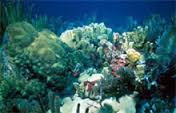It is more than a guilty pleasure. I am an addict for watching the terrific Netflix Original Series “Bloodline.” So much so, that I just had to explore how, or if, nutrient runoff is having an impact on the Florida Keys’ beautiful and environmentally fragile area.
What I found is typical and, at least for me in this case, disheartening.
Despite the myriad abusers of the only continental coral reef in the United States, a reef that is third in size only to those that exist off the coasts of Australia and Belize, its number one threat remains nutrient runoff.
This passage from Reef Relief Founders is particularly unsettling:

The over-abundance of nutrients in the ocean is the single biggest threat to Florida’s coral reefs. Nutrients is a scientific term for organic and inorganic materials that can include phosphates, and/or nitrates, usually from untreated and partially treated sewage, fertilizers and other pollutants. They promote algal blooms which rob the water of oxygen and compete with corals for habitat. Every year, 700 tons of nutrients are discharged into Keys waters from agricultural run-off from the Everglades. Another 33 tons of land-based sources of pollution are discharged from the landbase in the Keys, primarily from inadequately treated sewage and stormwater. Harmful algal blooms can result in eutrophication, when oxygen levels become so low that fish and other marinelife cannot survive.
